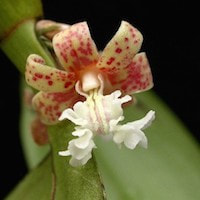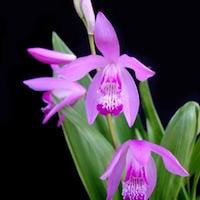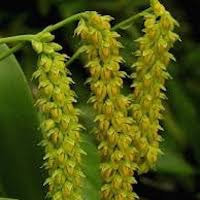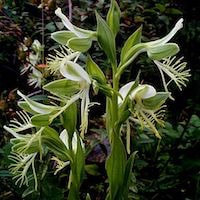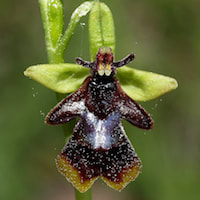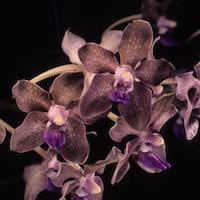Orchid Aromatherapy: A Women's Delight
The orchid fragrance oil captures the scented notes of various orchids, accompanied by additional fragrance components like fresh ozone accord, toscanol, celery, aloe vera, fern, rhubarb, water, patchouli, spruce, and peppermint. These combined elements result in unique and captivating fragrance compositions.
One of the featured orchids is Flickingeria Fimbriata, a native Singaporean orchid with a delightful watermelon scent. It thrives in lowland evergreen forests, medium elevation semi-deciduous forests, and rocky areas near streams and rivers. With its large-sized epiphytes, long branching rhizomes, and vibrant yellow pseudobulbs, Flickingeria Fimbriata produces sweetly scented flowers that bloom during the spring, summer, and fall. Additionally, this orchid holds significance in traditional herbal medicine, associated with rejuvenation and life-prolonging properties.
Bletia hyacinthina, on the other hand, is valued for its medicinal uses in the Malaya region. Known for its demulcent qualities, it is employed as a remedy for dysentery, hemorrhoids, and ague. Furthermore, it is utilized as a soothing medication for children with dyspepsia and serves as a treatment for burns, wounds, and various skin diseases.
Two other orchids, Bulbophyllum cariniflorum and Bulbophyllum densiflorum, known as Jianyeshiduo Lan, are found in different parts of China, northern Thailand, northeast India, Bhutan, and Nepal. Flourishing in moist habitats, they bloom during May and June following the arrival of monsoon rains. Interestingly, in some regions, a paste made from their dried roots, black pepper, and cow's milk is used to induce abortion during the first trimester.
Habenaria davidii, also referred to as Changjuyufenghua, blooms from June to August and is found in forests, thickets, and grasslands across Hubei, Guizhou, Sichuan, Yunnan, Tibet, and Xizang Yunnan. In Chinese herbal medicine, its roots are utilized to reduce swelling and protect the kidneys. Moreover, it is employed in the treatment of hernias and firm swellings of the lymph nodes.
The fly orchid, Ophrys insectifera, is a European species that relies on wasps and bees for pollination. Its flowers emit a scent that resembles female sexual pheromones, attracting these pollinators. The fragrance of the fly orchid carries a distinct allure with its mimicry of female pheromones.
Finally, Vanda tessellata, a robust and adaptable orchid, thrives in lowland environments in Sri Lanka, India, Nepal, and Myanmar. Demonstrating resilience to varying levels of sunlight, high temperatures, and low humidity, it is renowned in traditional herbal medicine for its anti-arthritic and anti-inflammatory properties. Additionally, it is considered beneficial in the treatment of rheumatism and other related conditions.
One of the featured orchids is Flickingeria Fimbriata, a native Singaporean orchid with a delightful watermelon scent. It thrives in lowland evergreen forests, medium elevation semi-deciduous forests, and rocky areas near streams and rivers. With its large-sized epiphytes, long branching rhizomes, and vibrant yellow pseudobulbs, Flickingeria Fimbriata produces sweetly scented flowers that bloom during the spring, summer, and fall. Additionally, this orchid holds significance in traditional herbal medicine, associated with rejuvenation and life-prolonging properties.
Bletia hyacinthina, on the other hand, is valued for its medicinal uses in the Malaya region. Known for its demulcent qualities, it is employed as a remedy for dysentery, hemorrhoids, and ague. Furthermore, it is utilized as a soothing medication for children with dyspepsia and serves as a treatment for burns, wounds, and various skin diseases.
Two other orchids, Bulbophyllum cariniflorum and Bulbophyllum densiflorum, known as Jianyeshiduo Lan, are found in different parts of China, northern Thailand, northeast India, Bhutan, and Nepal. Flourishing in moist habitats, they bloom during May and June following the arrival of monsoon rains. Interestingly, in some regions, a paste made from their dried roots, black pepper, and cow's milk is used to induce abortion during the first trimester.
Habenaria davidii, also referred to as Changjuyufenghua, blooms from June to August and is found in forests, thickets, and grasslands across Hubei, Guizhou, Sichuan, Yunnan, Tibet, and Xizang Yunnan. In Chinese herbal medicine, its roots are utilized to reduce swelling and protect the kidneys. Moreover, it is employed in the treatment of hernias and firm swellings of the lymph nodes.
The fly orchid, Ophrys insectifera, is a European species that relies on wasps and bees for pollination. Its flowers emit a scent that resembles female sexual pheromones, attracting these pollinators. The fragrance of the fly orchid carries a distinct allure with its mimicry of female pheromones.
Finally, Vanda tessellata, a robust and adaptable orchid, thrives in lowland environments in Sri Lanka, India, Nepal, and Myanmar. Demonstrating resilience to varying levels of sunlight, high temperatures, and low humidity, it is renowned in traditional herbal medicine for its anti-arthritic and anti-inflammatory properties. Additionally, it is considered beneficial in the treatment of rheumatism and other related conditions.
Download the guided mediation that works best with this Orchid fragrance oil
| women_fresh_essential_oil_orchi_00003.mp3 | |
| File Size: | 158523 kb |
| File Type: | mp3 |
Embrace the Fresh Essence of Fresh 3
Contains Scented Notes of following in various proportions:
Native Singaporean Orchid notes: Flickingeria Fimbriata
|
Flickingeria Fimbriata - Used in Fresh 3 (Women) for Team building Perfume workshop
Flickingeria fimbriata, also known as Dendrobium plicatile, possesses a captivating watermelon scent. This orchid species can be found thriving on open rocks and bluffs along streams and rivers in lowland evergreen forests and medium elevation semi-deciduous forests. It is characterized by its large size and features a long branching rhizome with freely branching stems that give rise to compressed pseudobulbs of a vibrant yellow color. During the spring, summer, and fall, Flickingeria fimbriata produces leaves and blooms on a single flowered inflorescence, with each flower emitting a sweetly scented aroma. Although it is considered one of the toughest orchids to manage, cultivating and tending to this species can be highly rewarding. In Sanskrit, it is known as "Jivanti," which translates to "life." Flickingeria fimbriata is revered for its association with various medicinal herbs known for their potent tonic properties, believed to possess rejuvenating and life-prolonging effects. Remarkably, Flickingeria fimbriata has gained significant attention and acclaim, evident in its extensive collection of names across India, with more than three dozen names, including 32 in Sanskrit. Its popularity extends beyond borders as it is shipped in large quantities. It is renowned for its reputation as an aphrodisiac and has even been shortlisted as one of the two potential candidates for the mythical Sanjeevani herb mentioned in the Ramayana, a legendary Indian epic, which is believed to possess the power to revive the dying. |
Therapeutic Orchid notes:
|
Bletia hyacinthina
Bletia hyacinthina is a species of orchid known for its medicinal properties. In the Malaya region, it has been traditionally used as a remedy for various ailments. It is particularly valued for its effectiveness in treating conditions such as dysentery, hemorrhoids, and ague. Additionally, Bletia hyacinthina has been applied topically as a soothing medication for children with dyspepsia, providing relief when applied over their abdominal area. This orchid is considered to have demulcent properties, making it beneficial in the treatment of dyspeptic disorders. It is often used to alleviate symptoms associated with indigestion and other gastrointestinal issues. Furthermore, Bletia hyacinthina is utilized in the treatment of burns, wounds, and various skin diseases. Its therapeutic qualities make it a valuable resource in traditional medicine practices for addressing these conditions. The usage of Bletia hyacinthina in traditional medicine reflects the deep-rooted belief in its healing potential and its effectiveness in promoting well-being and treating specific ailments. |
|
Bulbophyllum cariniflorum and Bulbophyllum densiflorum
Chinese name: Jianyeshiduo Lan Indian name: Sumura Bulbophyllum cariniflorum and Bulbophyllum densiflorum are orchid species commonly known as Jianyeshiduo Lan in Chinese and Sumura in Indian. They are found in various regions, including China, northern Thailand, northeast India, Bhutan, and Nepal. These orchids thrive in moist habitats and typically bloom between May and June, coinciding with the arrival of the monsoon rains. In some specific regions, such as the districts of Mondanala and Sutanguni in the Niyamgiri Hill Ranges of Orissa, India, a paste is prepared from the dried roots of Bulbophyllum cariniflorum and Bulbophyllum densiflorum. This paste is mixed with black pepper and cow's milk and consumed over several days to induce abortion during the first trimester of pregnancy. It is important to note that this practice is specific to certain areas and not widely adopted in general medical or traditional medicine practices. The usage of these orchid species in such a manner reflects their local cultural and traditional practices. However, it is essential to approach reproductive health and medical interventions with caution and consult qualified healthcare professionals for appropriate guidance and support. |
|
Habenaria davidii Franch. Syn. Habenaria leucopecten Schltr.
Chinese name: Changjuyufenghua (Long distance jade phoenix flower) Chinese medicinal name; Shuangshencao Habenaria davidii, also known as Habenaria leucopecten, is a species of orchid. In Chinese, it is called Changjuyufenghua, which translates to "Long distance jade phoenix flower." It is also referred to as Shuangshencao in Chinese medicinal terminology. This orchid species blooms from June to August. It is endemic to certain regions and can be found in forests, thickets, and grasslands spanning a crescent-shaped area from Hubei, Yunnan, and Guizhou to Sichuan, Yunnan, southern Xizang (Tibet), and Yunnan. In Chinese herbal medicine, the roots of Habenaria davidii are utilized for their medicinal properties. They are known to have anti-inflammatory effects and are used to reduce swelling and protect the kidneys. This herb is employed in the treatment of conditions such as hernia and firm swellings of the lymph nodes. The traditional use of Habenaria davidii in Chinese herbal medicine reflects the knowledge and practices passed down through generations for managing specific health concerns. It is important to note that while traditional usage of herbs can hold cultural and historical significance, it is advisable to consult with trained herbalists or healthcare professionals for appropriate guidance and dosage recommendations when considering the use of herbal remedies. |
|
Ophrys insectifera
Ophrys insectifera, commonly known as the fly orchid, is a species of orchid belonging to the genus Ophrys. It is native to Europe and typically grows in habitats with alkaline soil conditions. The distinctive feature of this orchid is its resemblance to a fly, which plays a crucial role in its reproductive process. The fly orchid has a unique pollination strategy that relies on wasps and bees. Like many other plants that depend on wasps for pollination, the fly orchid attracts these insects by releasing a fragrance that mimics the scent of female sexual pheromones. The scent acts as a powerful lure, enticing male wasps and bees that are seeking a mate. As the insects approach the flower, they inadvertently help with the pollination process by transferring pollen to other flowers. By imitating the scent of female sexual pheromones, the fly orchid deceives male wasps and bees into believing that they have found a potential mate. This clever adaptation ensures the orchid's reproductive success as the insects unknowingly assist in cross-pollination. The unique relationship between the fly orchid and its pollinators demonstrates the remarkable strategies employed by plants to ensure their survival and reproduction. Through the release of scent that mimics female sexual pheromones, the fly orchid effectively entices and utilizes the instincts of wasps and bees for successful pollination. |
|
Vanda tessellata (Roxb.) Hook. ex G. Don Vanda roxburghii R. Br.
Sri Lankan names: Anuradhapura Orchid, Grey Orchid, Rat-tha, Arattha, Rasni Indian names: Naguli (Tamil), Banki (Orissa), Nai (Bengal), Bandanike (Canaarese), Banda, Nai, Perasara, Persara, Vanda, San, Alisara (Hindi), Atirasa, Bhujangakshi, Chhatraki, Dronagandhika, Elaparni, Gandhanakuli, Muktarasa, Nakuleshta, Nakuli, Palankapa, Rasadhya, Rasana, Rasya, Sarpagandha, Shreyasi, Suggandha, Sugandhimula, Surasa, Suvaha, Vandaka, Vriksharuha, Yuktarasa (Sanskrit), Darebanki (Santal), Chittiveduri, Kanapabadanika, Mardaru, Vadanika (Tel- ugu), Banda (Urdu), Knapachettu (Madras Presidency in 1933), Jarakindu, Japa (Madhya Pradesh), Ippa vajrnika (Gonds of Andra Pradesh), Vandekigidda (Karnataka), Maravazha (Kerala) Indian medicinal names: Rasna in Sanskrit, Hindi, Marathi, Bengal and Mumbai. However, Rasna refers more commonly to Pluchea lanceolata which is not an orchid. Rasha (Unani) Nepalese names: Parajiva, Rasna Arabic name: Kharkittan Persian name: Zanjabeel-e-shami Thai name: Ueang sam poi India (in Chiang Mai), Ueang suea lek (in Bangkok) Vanda tessellata, also known as Anuradhapura Orchid, Grey Orchid, Rat-tha, Arattha, Rasni, is a robust, lowland, epiphytic orchid that is found in Sri Lanka, India, Nepal, and Myanmar. It often grows in close proximity to human habitation and exhibits a remarkable ability to tolerate varying levels of sunlight (ranging from 27% to 93%), high temperatures (26-31°C), and low relative humidity (31-44%). The phytochemistry of Vanda tessellata reveals the presence of various compounds, including alkaloids, tannins, resin, saponin, beta and gamma sitosterols, fatty oil, and coloring agents. Studies have demonstrated that an extract from the entire plant exhibits anti-acetylcholine and anti-arthritic effects in rats. Additionally, the orchid contains two anti-inflammatory compounds known as hepcosame (C27 H56) and octacosonol (C28 H58 O). Another noteworthy compound isolated from V. tessellata is tessallatin, a phenanthropyran. In traditional herbal medicine, Vanda tessellata has been extensively used and mentioned in ancient Sanskrit writings under the names Rasna and Raasnaa. It is described as a bitter and aromatic herb with beneficial properties for rheumatism. Rasna was employed to treat various ailments, including nervous disorders, rheumatism, scorpion stings, dyspeptic conditions, bronchial affections, and rheumatic fever in India. Different parts of the plant were utilized for specific purposes, such as the roots being used as ear drops, the whole plant for treating fractures, and the roots as a contraceptive. The leaves were believed to prevent wounds from becoming purulent sores and were used to alleviate tearing and earaches, sometimes in combination with aerial roots and neem oil. Vanda tessellata was also used in the treatment of secondary syphilis, snake bites, and scorpion bites. The Dongria Kandha tribe of the Niyamgiri Hills in southwest Orissa has a traditional practice of using a decoction of V. tessellata root mixed with honey to treat sexually transmitted diseases (STDs). Vanda tessellata is known for its fragrant characteristics, emitting a strong floral scent. This fragrance is attributed to compounds such as linalool (23%), methyl benzoate (61.5%), cinnamic aldehyde (0.1%), and methyl cinnamate (4.6%). Additionally, the orchid contains traces of other molecules, including benzyl acetate, alpha-ionone, 3-phenylpropanal, p-cresol, and indole. The fragrance of V. tessellata is transmitted to its F1 and F2 progeny when crossed with other Vanda species. Notably, the roots of V. tessellata also possess a pleasant fragrance. |
Other scent note
Fresh ozone accord, Toscanol, Celery, Aloe Vera, Fern, Rhubarb, Water, Patchouli, Spruce, Peppermint
Scentopia Library Reference ingredient
Coconut- Singapore plants - Check details at Scentopia's scent library
Join Scentopia's wonderful orchid scent crafting, fragrance tour, bridal shower or corporate team building which includes perfume making onsite and offsite, beach activities and more. We also serve primary school learning journey, secondary students and pupil on industrial excursions. Know more about our orchids perfume bar or therapeutic orchid scents and other wellness aromas. Conatct Perfume workshop or book a scent crafting session here.
